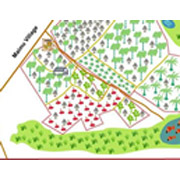Understanding diversity: a study of livelihoods and landscapes in Liberia
"Community forestry is high on the forest policy agenda in Liberia. However, relatively little is known about the diverse variety of customary forest management institutions and arrangements. Similarly, while the importance of forests and forest products in rural livelihoods is generally acknowledged, there has been little systematic study and analysis of just how forests fit into rural livelihoods.
There is a danger that community forestry policy will be based on a false assumption that there is some sort of vacuum of
institutional arrangements in rural areas and that standardized models of community forestry management will be developed and imposed on diverse existing community forestry management practices..."

Photo: IUCN
"...This was an issue because international experience has shown beyond any doubt the risks associated with imposing standard models where local contexts are highly varied and especially the risks of imposing new management arrangements without understanding what already exists. These risks include the potential to undermine existing customary management arrangements.
The study “Understanding diversity: A study of Livelihoods and Forest Landscapes in Liberia” was initiated by the Livelihoods and Landscapes Strategy (LLS) of IUCN (The International Union for Conservation of Nature) in order to obtain a clearer picture of the variety of forest use and customary forest management practices in Liberia and to use the information and insights to contribute to policy formation.
The study was carried out by a research team who visited each of seven landscapes with a variety of features, including different forest types and different livelihood strategies. The study applied direct observation combined with participatory methods.
The study found that, despite common assumptions, many sites maintain customary methods and rules for the management of forest resources, or at least of some forest resources and that there are institutional practices for decision-making about use of these resources. The local institutions are diverse and well established.
The study also confirms the fact that rural people in many parts of Liberia rely heavily on a variety of tree and forest and other natural resources and products for their livelihoods and it provides a picture of the diverse ways in which these different resources are used as livelihood assets..."
